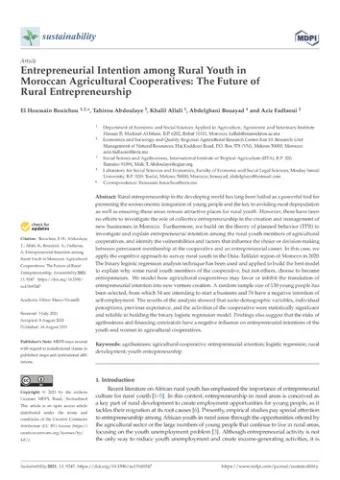Entrepreneurial intention among rural youth in Moroccan Agricultural Cooperatives: the future of rural entrepreneurship

Abstract
Rural entrepreneurship in the developing world has long been hailed as a powerful tool for promoting the socioeconomic integration of young people and the key to avoiding rural depopulation as well as ensuring these areas remain attractive places for rural youth. However, there have been no efforts to investigate the role of collective entrepreneurship in the creation and management of new businesses in Morocco. Furthermore, we build on the theory of planned behavior (TPB) to investigate and explain entrepreneurial intention among the rural youth members of agricultural cooperatives, and identify the vulnerabilities and factors that influence the choice or decision-making between permanent membership at the cooperative and an entrepreneurial career. In this case, we apply the cognitive approach to survey rural youth in the Drâa-Tafilalet region of Morocco in 2020. The binary logistic regression analysis technique has been used and applied to build the best model to explain why some rural youth members of the cooperative, but not others, choose to become entrepreneurs. We model how agricultural cooperatives may favor or inhibit the translation of entrepreneurial intention into new venture creation. A random sample size of 130 young people has been selected, from which 54 are intending to start a business and 76 have a negative intention of self-employment. The results of the analysis showed that socio-demographic variables, individual perceptions, previous experience, and the activities of the cooperative were statistically significant and reliable in building the binary logistic regression model. Findings also suggest that the risks of agribusiness and financing constraints have a negative influence on entrepreneurial intentions of the youth and women in agricultural cooperatives.
